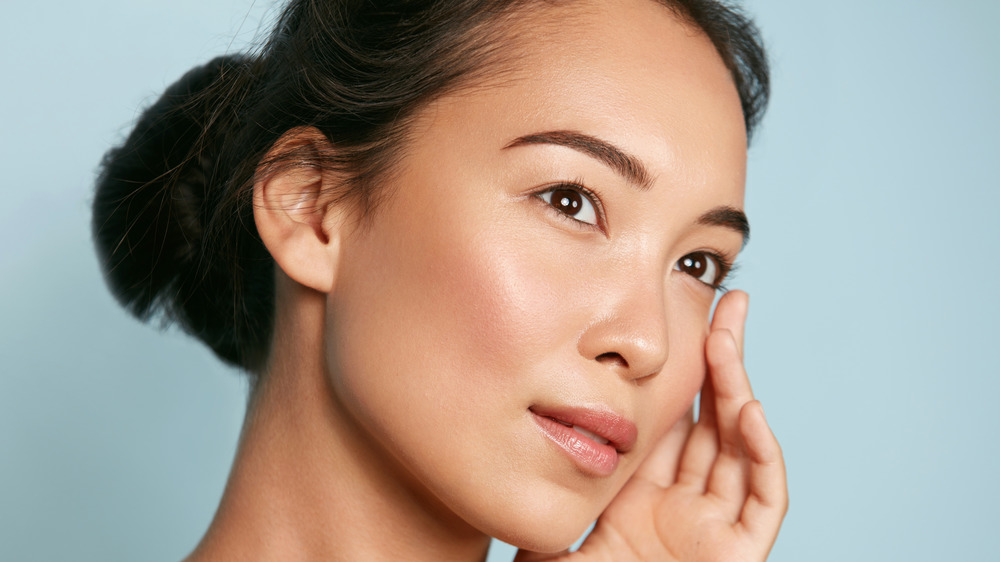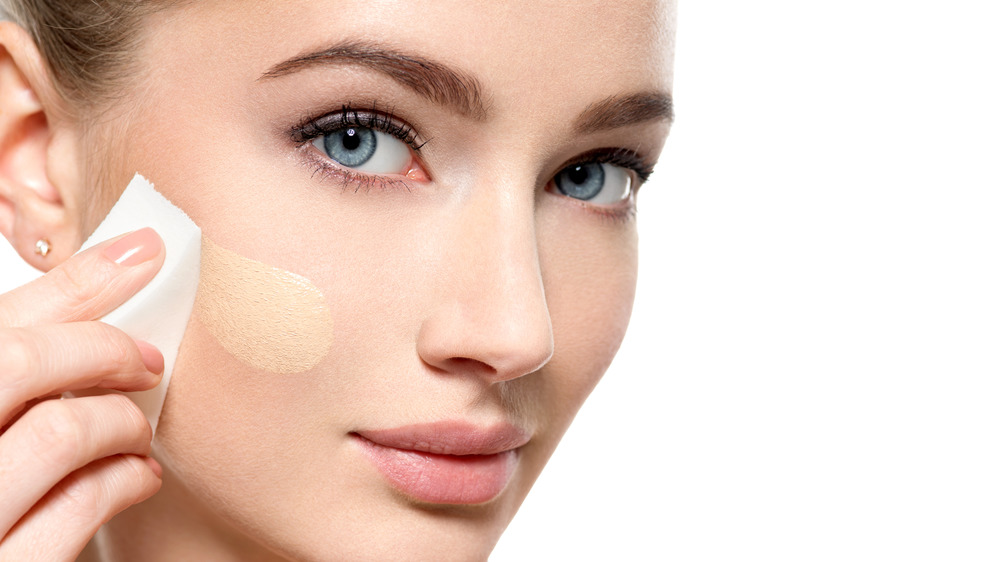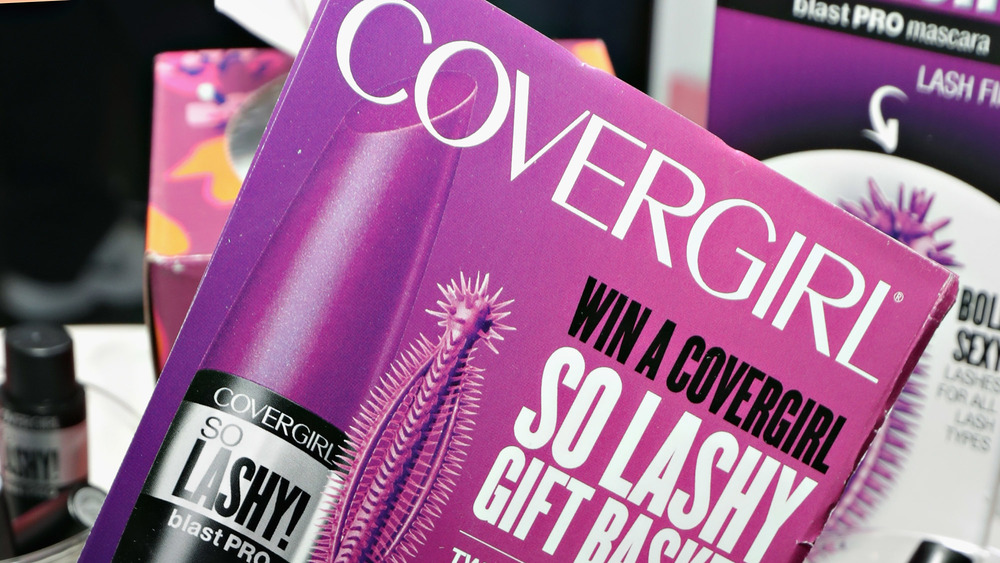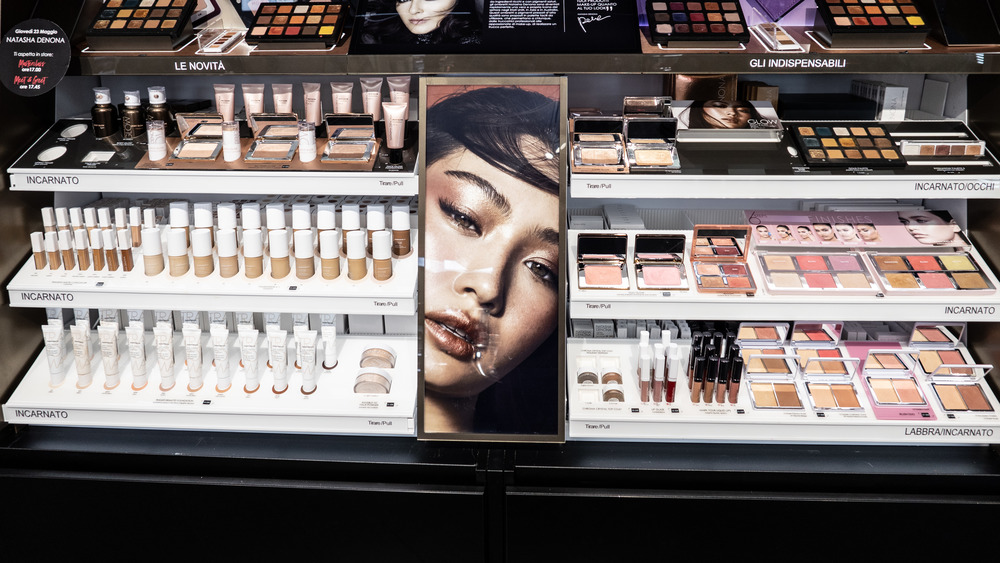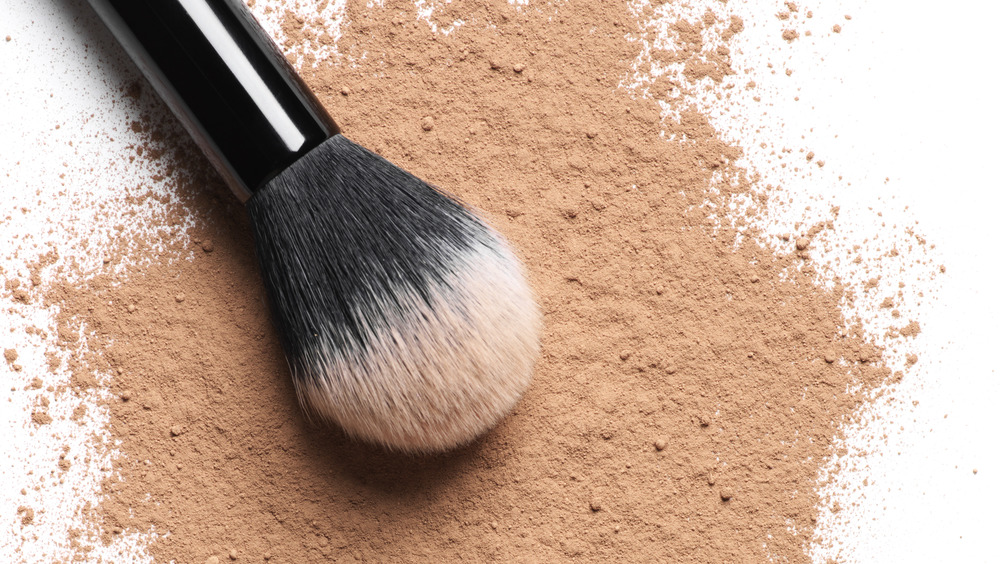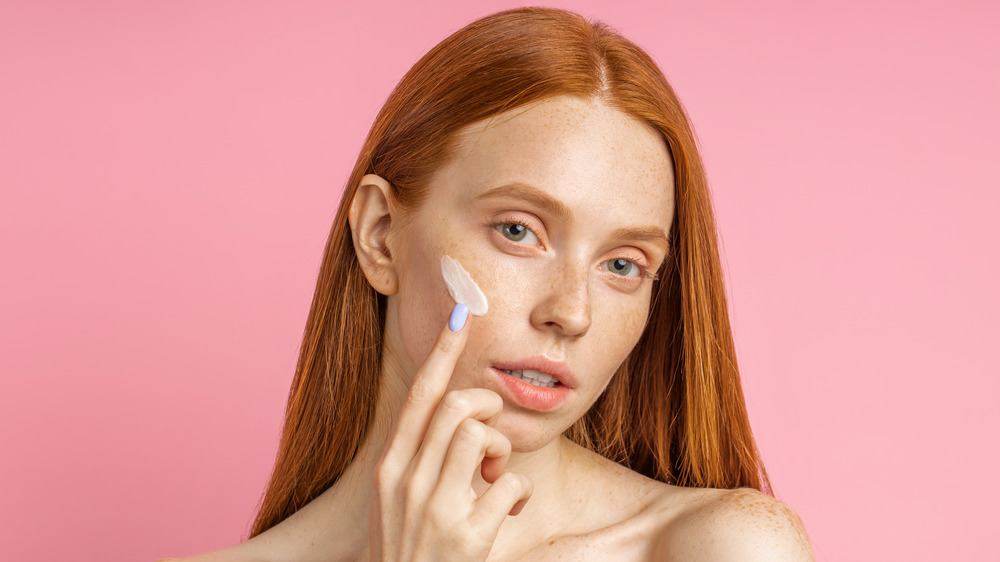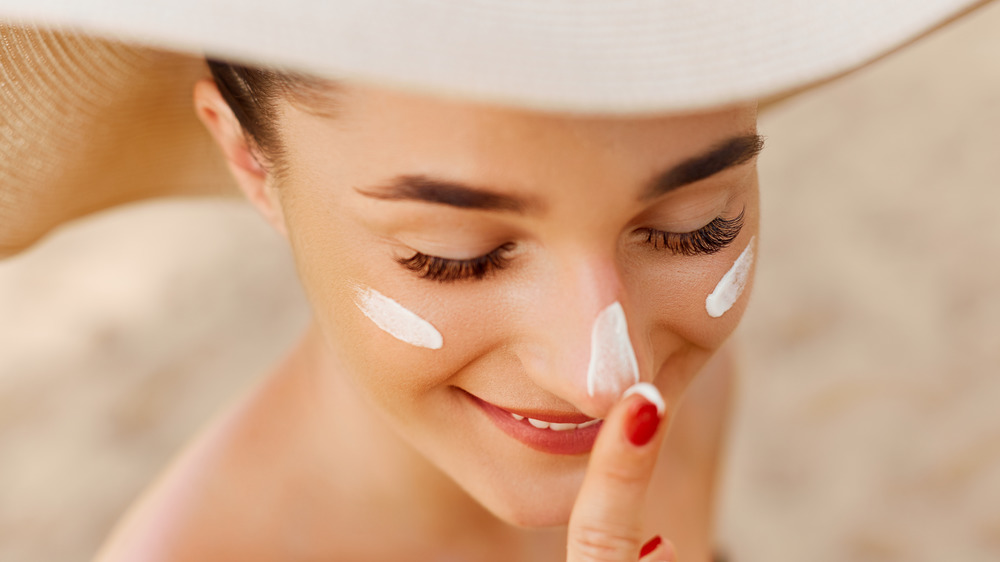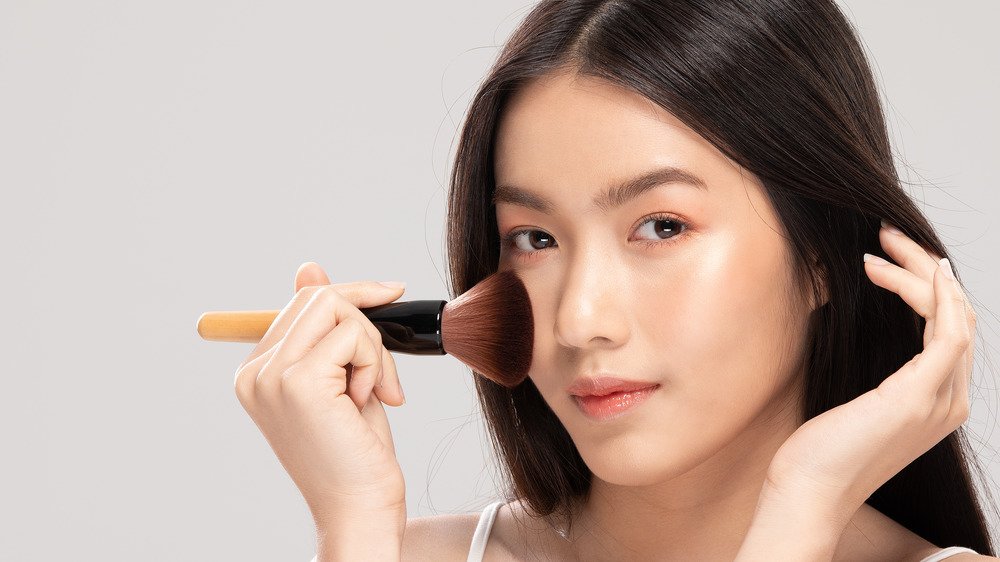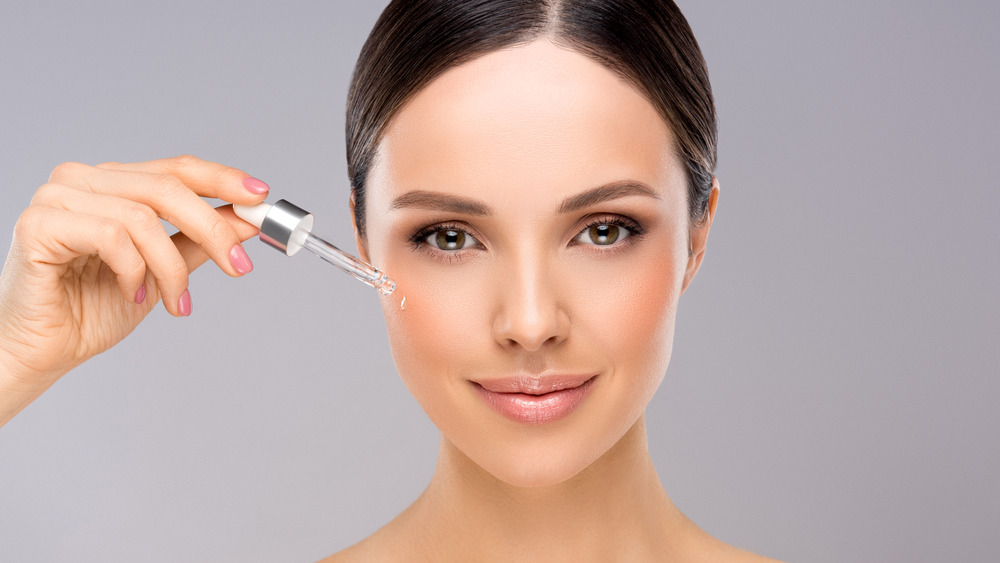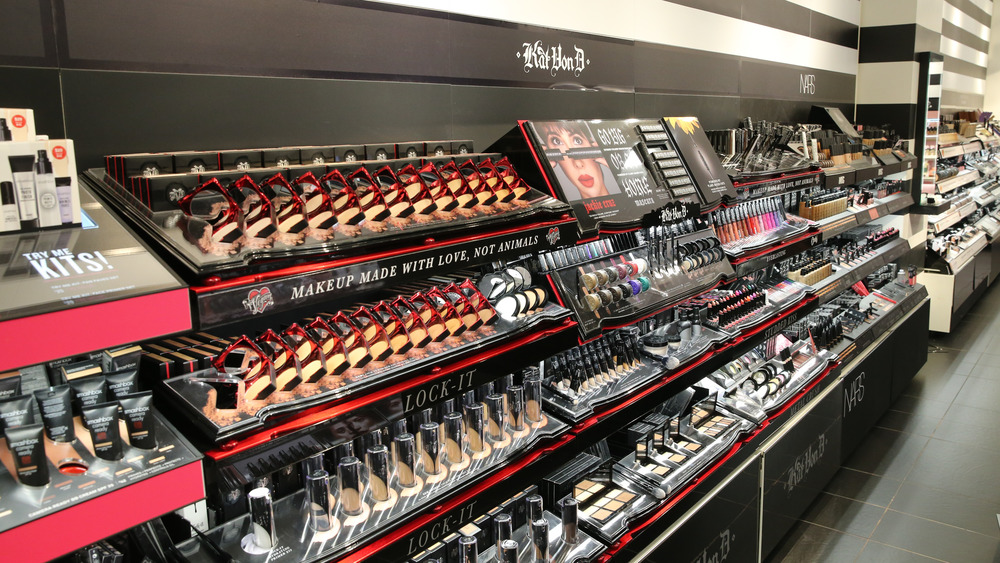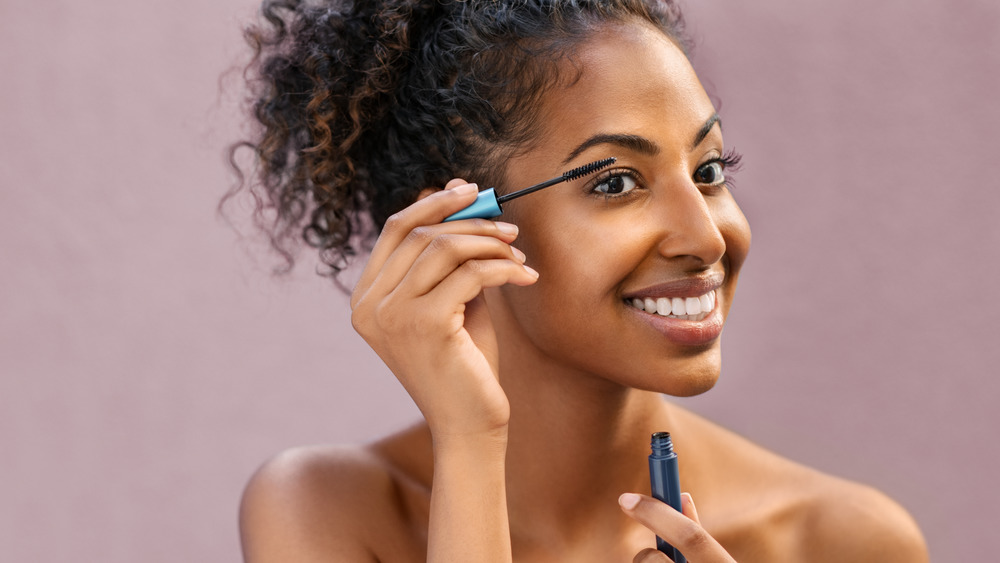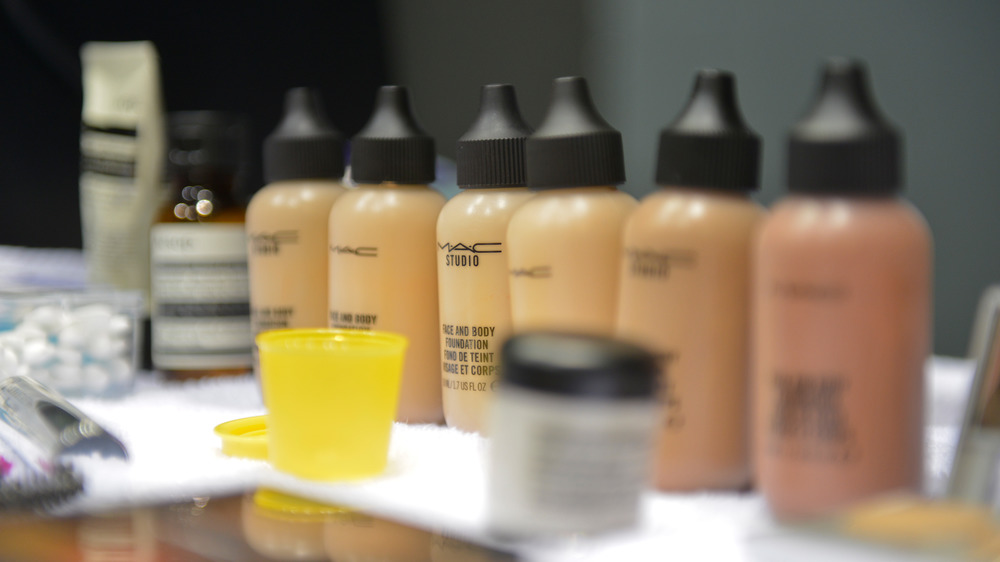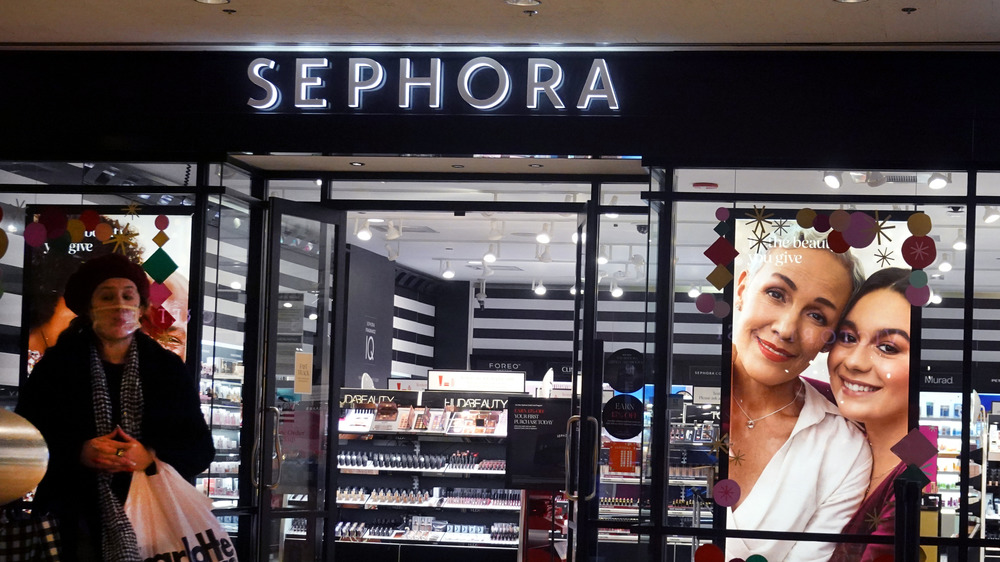Makeup You Should Never Use If You Have Sensitive Skin
We may receive a commission on purchases made from links.
Finding the perfect makeup products seems like a lifelong quest. First of all, there are so many makeup brands on the market, and they all claim to have different benefits. Some are clean and cruelty free, others are supposed to help with acne. Some are hydrating to the skin, while others leave the face looking matte and completely shine free. It seems like you have to try every makeup product out there to see if you're really going to like it, but if you have sensitive skin, that might not be an option.
So many people with sensitive skin have to be so careful with what products they use. Plus, it's hard to know these days just what makeup lines will leave the skin feeling soothed, and which ones will leave the face with new breakouts, red patches, and dry spots.
To that end, we did the necessary digging for all you sensitive skinned folks out there so you don't have to. Ever wondered what makeup ingredients you should avoid? What primer should you use, and what concealer should you avoid? Wonder no more, here is the makeup you should never use if you have sensitive skin.
This common makeup ingredient can irritate your sensitive skin
A lot of us are pretty good at looking through the ingredients list of our food, but when it comes to makeup, some of us aren't so diligent. A lot of cosmetic products and makeup lines use phthalates in their products, and if your skin is prone to react easily, phthalates should absolutely be on your no-go list. As noted by The Washington Post, phthalates are used to "help dissolve other ingredients into a consistent solution," so think any kind of liquid foundation. But phthalates can negatively impact your body's hormones, and if you have sensitive skin that's prone to breakouts, messing with your hormones is the last thing that you want to do.
If you're looking for a product that will help blur your skin and give off that foundation look, but you don't want a product full of phthalates, opt for this moisturizing primer from TULA. As noted by Bustle, its inclusion of chia and licorice root help your skin glow, but it's the ingredients that are left out that you really want to focus on: no parabens, no phthalates, no preservatives.
If you're acne prone, avoid these types of foundations
Acne is one of the makeup industry's biggest employers. Think about it — how many of us spent our teenage years running to the drugstore to buy CoverGirl's full coverage foundation because we had pimples on our chins? If only we knew then that the foundations we were clinging to were actually making our acne worse. So if you're dealing with acne, chances are you're looking to cover it up, but you could be doing more damage to your skin if you're using the wrong products.
As noted by Epiphany Dermatology, foundations with oil as a main ingredient can clog your pores and can actually cause more breakouts than not. Without giving your skin the chance to breathe under all that foundation, your acne isn't going to get any better.
So instead, opt for a foundation like the bareMinerals tinted hydrating gel cream. As noted by Byrdie, it has SPF 30 (a must for all skin types) and uses plant-based squalene, which is a very similar oil to the type that our face naturally produces. By covering up your acne less, it will actually improve.
You might want to say no to some drugstore brands if you have sensitive skin
It's easy to meander around Target and subconsciously wander over to the makeup section; sometimes a $40 concealer from Sephora doesn't sound attractive, so what's the harm in picking up a $12 one? A lot, actually, especially if you have sensitive skin.
One of the biggest problems that makeup wearers with sensitive skin contend with is dryness, and if you think it's impossible to find a concealer that doesn't make your under eyes look like the desert, then you need to rethink the products you're buying. Some concealers, like the TruBlend Undercover concealer from CoverGirl, contain alcohol. Is that such a bad thing? Yes. As noted by Epiphany Dermatology, products with alcohol as an ingredient will irritate your skin and will dry it out, a bad combination. So if your concealer is making your eyes and the skin around it feel like it's burning, chances are it's the alcohol doing the damage. Just think about it — you wouldn't put rubbing alcohol directly on your face, so avoid it in your products.
So read that ingredients list, friends, and save your sensitive skin from more damage.
If you have sensitive skin, avoid makeup with any kind of added scents
We won't deny it, we love anything that smells good. When we were kids and Claire's had the "best" makeup products, we would opt for the lip gloss that tasted like vanilla or the eyeshadow palette that smelled like different fruity flavors. As adults, we've grown out of that (sort of), but any kind of synthetic scent that's hiding in your makeup could be having a huge impact on your skin if it's sensitive.
According to Epiphany Dermatology, lab-made fragrances feature chemicals that "stabilize" the scent, allowing your makeup product to smell good for an extended period of time. Because of that, the products with the best scents often contain some chemicals like sulfates and sulfides, so chances are, your sensitive skin is reacting to said chemicals. And this is where you have to be careful, because the FDA only requires that the chemicals used to maintain a makeup product's scent be listed as "fragrance."
So even if your favorite makeup product smells amazing, chances are there's some ingredients in there that are causing your sensitive skin to react.
Some finishing powders will have to go on your no list if your skin is sensitive
The age old question: is setting powder or setting spray better? If you typically opt for powder and you have sensitive skin, you might want to rethink what you're using. For example, a go-to setting powder for a lot of people is the Laura Mercier translucent setting powder, so the following may come as a disappointment: the powder's main ingredient is talc. Yes, talc, the ingredient that's caused some major lawsuits and a lot of health problems. And if you have sensitive skin, talc might be causing your skin to react in a less than cute way.
Dr. Purvisha Patel, a dermatologist who founded Visha Skincare, told Byrdie that talc can cause some serious reactions for people with sensitive skin. "Those that may have irritation when it is used in the folds of skin are people who tend to have sensitive skin reactions and hive easily," she explained. "The rubbing of the particles may cause increased irritation to them." Patel added that talc can also irritate the eyes and can cause some serious problems if it's inhaled. So listen to the expert, say no to talc.
Avoid pore-clogging primers and protect your sensitive skin
There was once a time when none of us used primer, and our beauty blenders were bone dry. Luckily, we've evolved since then, but irritants causing your sensitive skin to react may be hiding in your primer — the product that you use pretty much every day.
Like some foundations, primers with a laundry list of chemical ingredients could be clogging your pores, making it impossible for your skin to breath and release any dirt or oils. You don't want this, we promise, so instead of going for the primer with the lowest price tag and the cutest packaging, opt for a primer that contains an AHA, such a glycolic acid. This ingredient will, according to dermatologist Dr. Adebola Dele-Michael, both exfoliate and hydrate the skin and "will not be too irritating" (via The Zoe Report). Sounds good to us.
If you trust a dermatologist with a primer suggestion (and we think you should), listen to Dr. Heidi Waldorf, who recommends the Blemish Rescue Anti-Redness Mattifying Primer from bareMinerals (and it's for acne-prone skin too). Waldorf explained that the sulfur present in the product is both antibacterial and anti-inflammatory, so it's a win-win.
If you have sensitive skin, don't opt for foundation that has chemical sunscreen
Sun protection is key, but if you have sensitive skin, you're going to want to pay attention to what sunscreen you're using. Whether your SPF is in your foundation or you apply your sunscreen before your makeup, you have to make sure that you're using a mineral sunscreen, not a chemical one.
According to Harper's Bazaar, chemical sunscreens absorb into the skin (which is why they're a favorite of makeup wearers), but that's only possible because it's full of — you guessed it — dubious chemicals. It could very easily be irritating your skin, so watch out for foundations that include such a sunscreen. Instead, opt for a mineral sunscreen, a product usually made up of just a couple ingredients like zinc oxide.
The downside to mineral sunscreens, for makeup users, is that they typically leave some sort of white residue. But according to dermatologist Dr. Anjali Mahto, mineral sunscreens are "better for the skin than chemical sunscreens, especially if you're prone to acne or other skin ailments." So go for a mineral sunscreen like this one from Drunk Elephant, and you won't be irritated or disappointed.
Skip foundation that has these kinds of parabens if you have sensitive skin
An ingredient that makes makeup products "fresh and germ-free" sounds great, right? Wrong: the reality of such ingredients could be making your sensitive skin that much worse. As noted by Allure, there are preservatives used in makeup products that start with methyl, butyl, and propyl on the list of ingredients. These all fall under the umbrella known as parabens, and they're absolutely a no-go.
Parabens are found in everything: eye makeup, foundation, bronzers, lipstick, you name it. And not only are parabens a "hormone disrupter," but they're known for causing a whole slew of problems. According to DermNet, parabens in your makeup could be causing irritant dermatitis, or in layperson's terms, a less-than-happy red reaction. So look for makeup products that are listed as paraben free, and in the meantime, spot test your current products to see what specific makeup is causing your skin reactions.
How do you do this? Use just a little bit of said product on a small area of your skin, like the inside of your arm, and see if your skin reacts. If it does, toss that product in the trash can.
Say no to makeup with essential oils, especially if you have sensitive skin
Essential oils are the latest in makeup and skincare fads. For starters, they smell so good, and a lot of them claim to have some incredible health benefits. We're not at all disputing that, but if you have sensitive skin, you might want to watch out for makeup products that list essential oils in the ingredients.
Kristina Holey, a skincare specialist, told The New York Times that she saw an increase in inflamed, red skin among her patients. The culprit? Essential oils. "Some constituents of certain essential oils, like those in bergamot, are transformed into chemicals and enzymes when exposed to sunlight, which can induce a photo-allergic response," Holey said. She continued, explaining that "volatile compounds" found in essential oils can compromise the "microbiome, or healthy flora" that the skin has.
So while essential oils sound great, and we love them for diffusers, having them present in your makeup might not be a good option.
Rule of thumb for sensitive skin: the less ingredients, the better
If you're weeding out ingredients that you just know you're sensitive skin doesn't like, but your makeup is still causing your skin to react, remember this golden rule: the less ingredients, the better. We've listed a number of different makeup ingredients that make sensitive skin go all kinds of crazy, but if you can't pinpoint exactly what's causing your skin to go dry, flaky, red, etc., go for makeup products that only include the bare minimum.
According to Byrdie, go for products that list what they don't include rather than what they do, like Alima Pure Oil Balancing Primer Powder. This makeup powder is a great option, especially for those of you out there who can't pinpoint exactly what's making your skin angry. It doesn't have fragrances, parabens, sulfates, silicone, talc, dyes, phthalates, the list goes on. What it is made up of is just four ingredients — that's right, four.
We know that it's not super fun to stand in Ulta and read through the laundry list of ingredients that your go-to foundation contains, so keep it simple: the less ingredients, the better off your skin will be.
This is how to find the best mascara for sensitive skin and eyes
A lot of people with sensitive skin find their faces reacting to foundation and primer, but the eyes go largely unchecked. Your eyes are so important to take care of, and on that windy day when they get irritated, it might not just be the wind: your mascara makes a difference.
According to Good Housekeeping, the ingredients used in mascara could be irritating the skin at the base of the lashes and under the eyes. To make matters worse, your mascara could be flaking off (or going into your eyes), making a bad situation even worse. So when you're at Sephora and you're looking for a new mascara, look for products that include the terms "hypoallergenic" or "allergy tested." Why? "Hypoallergenic implies that the brand has attempted to omit potential allergens that can cause reactions for some people," chemist Sabina Wizemann explained. Want to be even more specific? Wizemann suggests looking for mascara that's "ophthalmologist-tested," meaning that the product has been reviewed by an eye doctor.
So while you're looking through your foundation for bad ingredients, don't skip over the mascara — it could be just as bad.
Don't seek out foundation that is hydrating if you have sensitive skin
For makeup wearers with sensitive skin, it feels like you can't win. Don't get a foundation that's drying, it'll mess up your skin. Don't use a primer that clogs your pores, your acne will get worse. And unfortunately, we have another thing to add to the list: don't go for a foundation that's labeled as "hydrating." These foundations could be funneling gross oils into your skin that really shouldn't be there.
So instead of letting foundation be your moisturizer, opt for a clean moisturizer like CeraVe, and then go for a foundation like this one from Dermablend. This flawless liquid foundation is fragrance free, phthalates free, and oil free, so you're covered (pun not intended) there. But a big perk about this foundation is that the color is so pigmented, you literally only need one drop.
According to Bustle, a great way to use this product is to actually mix a drop or two of it with your favorite, non-irritating face moisturizer, and apply accordingly. Not only will your skin get the moisture that it needs, it will also look natural and color corrected. A win-win.
Avoid these types of ingredients in your makeup if you have sensitive skin
We love blush. We really do, and it's a love affair that's existed for far longer than the TikTok trend of putting a touch of blush on the end of your nose. Blush can be criminally underrated, and we're here to tell you that a good blush should be in your makeup bag. But, if you have sensitive skin, you'll want to avoid any blush that uses synthetic dyes. And if you're looking for a cheek tint that really screams natural, go for the cheek and lip tint from HAN Skincare.
As noted by Bustle, this is one of the few products on the market that can actually stand behind its all-natural claim; all of its ingredients are either mineral- or plant- based, and it features the smooth properties of coconut cream, shea butter, and argan oil. And again, it's one of those products that stands out because of what's not included: no dyes, no parabens, no silicones, no fragrance, no talc, no mineral oil (yuck), no phthalates, the list goes on. This is a must have product, whether you have sensitive skin or not.
If you have a nut allergy, you might want to look at your makeup's ingredients
We all witnessed the kid in elementary school having a peanut allergy — it was like a right of passage for '90s kids. But if you know that you have a nut allergy, severe or not, you should really be looking closely at your makeup products, we're serious. As noted by Verywell Health, soy or tree nuts are often used in makeup products. And while the ingredients are "unlikely to cause a major reaction," you might want to be careful if you have sensitive skin (even a small reaction is something we're trying to avoid).
If you're a big fan of a shimmery, kissed makeup look, opt for the mineral blush for subtle glow by Alima. Based on its product description, it's free of gluten, silicone, parabens, fragrances, sulfates, dyes, talc, and of course, nuts. It's also vegan and cruelty free, so there really isn't a con to this product.
